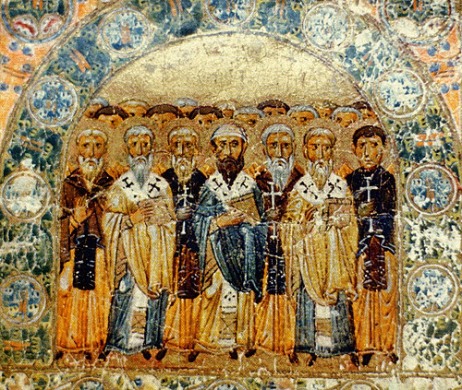Sent: Monday, 28 September 2015, 1:20
Subject: Happy 90th Birthday Brother Kentigern
Subject: Happy 90th Birthday Brother Kentigern
 |
| Church Fathers |
COMMENT:
Before Mass; the thought of ‘The Holy Sacrifice
Mass’ of priests for souls, Redemption.
Mt
7:21. Not everyone who says to me, Lord, will
enter the kingdom of heaven, but
only those who do the will of my Father in heaven.
Saint Fulgentius reminds us in the words.
"What can I offer the Lord that is worthy?...
Therefore those who want to offer God a worthy gift should begin by offering themselves".
Saint Fulgentius reminds us in the words.
"What can I offer the Lord that is worthy?...
Therefore those who want to offer God a worthy gift should begin by offering themselves".
Patristic Lectionary.
COMMENT: Check the Lectionary:
Sent: Monday 28,
September 2015,
Subject: St Fulgentius echoing Augustine iPad random after Night
Office
And opens the horizons of 'enlargingtheheart' with Sermons of Fulgentius
of Ruspe.
https://enlargingtheheart.wordpress.com/category/patristic/fulgentius-of-ruspe/
Second Reading special in Lectionary...
the variations of the translation, can be moving in prayer....throughout highlighted "children of God".
MONDAY
First Reading
Micah 6:1-16
Responsorq Sir 35:1-2; Ps 4:6
To keep the law is worth many offerings; to heed the commandments is a peace-offering. t To return a kindness is a grain-offering,
to give alms a thank-offering.
V. Make justice your sacrifice and trust in the Lord. To return ...
Second Reading
From a sermon by Saint Fulgentius of
Ruspe
Let us reflect together upon the
passage from Saint Micah which we have listened to together, and as we reflect
on it in words, my friends, may we fulfil it in deeds. For we have listened to
the words of a holy man, a righteous man, a devout man, a man concerned for his
own salvation, a man who knew he had been created by God and considered himself
subject to, a man who awaited the divine Judgment in great fear and trembling,
knowing that then, before the tribunal of the just Judge, he would have to give
an account not only of his words and deeds but even of his thoughts. And so,
pondering on the future judgment of God - which each one of us should also fear
and whatever we are doing remember with hearts full of dread - pondering on
this, that holy and just man asked what he should do, or rather with what gifts
he should implore the divine Judge.
But he knew that almighty God, who
created the universe, who made everything from nothing, who made nothing because
he felt the pinch of poverty but all from a wealth of goodness, asks not only
for our gifts but for our deeds. Or rather he knew that the gifts most pleasing
to God and acceptable to him were a holy life and good works. So when he asked
what gift one should offer God, he said: What can I offer
the Lord that is worthy? But what can be worthy to
offer God but the most excellent creature he has made? And assuredly, of all
the creatures God has made upon earth none better can be found than the one he
created in his own image; and that earthly creature is a human being.
Therefore those who want to offer God a worthy gift should
begin by offering themselves. For since God made us in his own image he is
delighted to be offered that image, and commands us to present it to him pure
and innocent. Hence our Saviour’s answer to some who were trying to trap him: Give to Caesar the things that are Caesar's, and to God the things that
are God's. In other words,
just as you give Caesar his image on a coin, so give God his image in yourself.
And when you give your Creator his own image it must be righteous, not evil;
humble, not proud; not debased by greed, deformed by rapacity, reduced by
vicious anger, worn away be earthly affections, soiled by envy, defiled by
debauchery; but kept undiminished by prudent care, pure by true faith, and
shining by good habits and deeds. The holy prophet tells us how to give God his
own image in ourselves when he says: I will show you
what is good and what the Lord requires of you. It is to act justly and
righteously, to love mercy, and to walk mindfully with your God.
Sent from my iPad..
Second Reading From a sermon by Fulgentius of
Ruspe.
When our Lord gave the commandment of love for one's enemies, .......
BIOGRAPHICAL SKETCH
Fulgentius of Ruspe, Saint (468-533) Fulgentius left the Roman civil service for the monastic life at the age of twenty-one. In 508 he became bishop of Ruspe in North Africa. A faithful disciple of Saint Augustine, he was the best theologian of his time, and possessed a fluent knowledge of
Greek. Many of his writings were directed against the Arians, from whom he suffered constant persecution.









